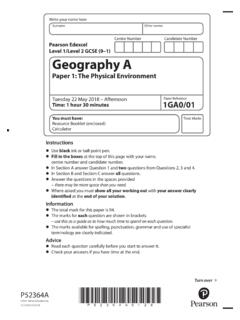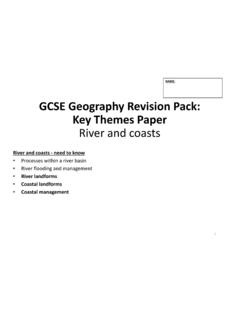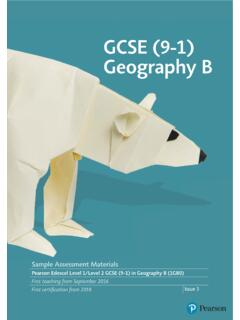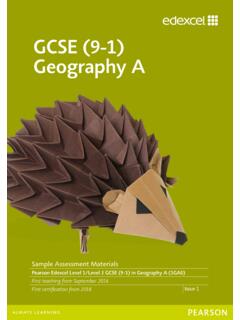Transcription of GCSE Edexcel Geography B Revision Workbook
1 gcse EdexcelGeography BRevision WorkbookQuwwat-Ul-Islam Girls' School16 Chaucer RoadForest GateLondon, E7 9N1 Table of of Assessment on how to revise for studies summary 1-5 practice of Assessment Objectives and Exam PapersThis is a breakdown to help you understand your gcse Geography you will identify total marks, percentages and time for each exam paper. Understanding command words Most people miss out on marks because they did not understand what the question was asking them to do. Make sure you know what your command words mean. These are the words that tell you what to skills will I be assessed on?Mathematics and Statistics Skills These skills are taken from the document Geography gcse subject content published by the Department for Education (DfE) April 2014. These skills may be assessed across any of the examined components.
2 Some mathematics and statistics skills are specific to particular subject content; these are indicated in the integrated skills sections within the topics throughout the specification. Cartographic skills: use and understand gradient, contour and spot height on OS maps and other isolinemaps interpret cross sections and transects use and understand coordinates, scale and distance describe and interpret geo-spatial data presented in a GIS frameworkGraphical skills: select and construct appropriate graphs and charts to present data, using appropriate scales and including bar charts, pie charts, pictograms, line charts, histograms with equal class intervals interpret and extract information from different types of graphs and charts including any of the above and others relevant tothe topic interpret population pyramids, choroplethmaps and flow-line maps Numerical skills.
3 Demonstrate an understanding of number, area and scale and the quantitative relationships between units design fieldwork data collection sheets and collect data with an understanding of accuracy, sample size and procedures, control groups and reliability understand and correctly use proportion and ratio, magnitude and frequency draw informed conclusions from numerical data Statistical skills: use appropriate measures of central tendency, spread and cumulative frequency (median, mean, range, quartiles and inter-quartilerange, mode and modal class) calculate percentage increase or decrease and understand the use of percentiles describe relationships in bivariate data: sketch trend lines through scatter plots; draw estimated lines of best fit; make predictions; interpolate and extrapolate trends be able to identify weaknesses in selective statistical presentation of data5 Familiarise yourself with each skill.
4 Identify your strengths and weaknesses and focus on improving those with exam practice. What skills will I be assessed on?Geographical skills Students are required to develop a range of geographical skills throughout their course of study. These skills may be assessed across any of the examined components. The full list of geographical skills is given below. Some geographical skills are specific to particular subject content; these are indicated in the integrated skills sections within the topics throughout the specification. Atlas and map skills: recognise and describe distributions and patterns of both human and physical features at a range of scales using a variety of maps and atlases draw, label, annotate, understand and interpret sketch maps recognise and describe patterns of vegetation, land use and communications infrastructure, as well as other patterns of human and physical landscapes describe and identify the site, situation and shape of settlements Graphical skills: label and annotate and interpret different diagrams, maps, graphs, sketches and photographs use and interpret aerial, oblique, ground and satellite photographs from a range of different landscapes use maps in association with photographs and sketches and understand links to directionsData and information research skills.
5 Use online census sources to obtain population and local geo-demographic information Investigative skills: identify questions or issues for investigation, develop a hypothesis and/or key questions consider appropriate sampling procedures (systematic vsrandom vsstratified) and sample size consider health and safety and undertake risk assessment select data collection methods and equipment to ensure accuracy and reliability, develop recording sheets for measurements and observation use of ICT to manage, collate, process and present information, use of hand-drawn graphical skills to present information in a suitable way write descriptively, analytically and critically about findings develop extended written arguments, drawing well evidenced and informed conclusions about geographical questions and yourself with each skill.
6 Identify your strengths and weaknesses and focus on improving those with exam practice. How to revise GeographyGeography gcse 9-1 Edexcel B Investigating Geographical Issues2. Make sure you understandThe first step in remembering anything is understanding it. These tips will help you with this: Make sure you ve seen a map of the place. In this day and age this is easy with google maps, google earth and google streetview. All of these things can help you understand both the 2-D and 3-D landscape of the case study. Find newspaper articles and pictures to give you some background and also help you to visual the place Watch videos if they exist. For some case studies there are amazing clips of films (Kibera, the Nairobi shanty town at the beginning of The Constant Gardner springs to mind). For others there will be great video clips on YouTube to help you.
7 If you can, visit the place. Nothing is as powerful as this in fully understanding a Get organisedMake sure you know what topics you are being tested on in which your topic checklists to organise your thoughts and Revision material 3. Revision cardsCondense your notes and information onto Revision different coloured cards torepresent each topic or a different case Mind mapsOrganise your case studies or topic notes onto mind maps. Aim for one topic per A3 page5. Use Seneca ClassroomUse our Seneca Classroom to retrieve Revision notes for more information. Retrieve your class code from your Revision booksPurchase a Revision book, specifically the Revise Edexcel gcse (9-1) Geography B Revision Guide published by Pearson around 6. ISBN 97812921337827. Memorise!Now you ve condensed your class notes you need to memorise them.
8 Good memorisation, in my experience comes down to two things: Repetition Using the information in different d advise you to do a combination of the following: Read index cards out loud, cover and test yourself. Get other people to test you. Act it out. Make up songs or rhymes Whatever else works for Exam command wordsUnderstand the command words used in exams. What is the difference between a describe and explain question?9. Past papersMake sure you re exam ready by practising to apply your knowledge to past questions10. Analysing mark schemesAnalysing the mark schemes to understand what the examiners are expecting you to websites and links Edexcel gcse Geography B Use this websites to helpyou with keywords, case studies and more! Channels:9-1 gcse Geography / Geographer Online9 For more Topical Keywords go to: more case study examples go to: DynamicsCase Study: IndiaWhere is India located?
9 Continent: AsiaNearby countries: Pakistan, Sri Lanka, Bangladesh, NepalNearby oceans: Indian Ocean, Arabian Sea, Bay of BengalIndia is the 7thlargest country in the world by land mass. Development DynamicsIndia s Economic DevelopmentThink like a geographer: How does India s location promote economic development? What other major economies are nearby? China! Now a major economy and superpower. India and China have existing political tensions. India is a former British colony. Is India landlocked? Which countries are easily accessed? India is not landlocked, meaning it can easily transport goods internationally by boat. India aims to become a major transport hub within south east Asia. Is India a large or small country? What about its population? India is a large country, with good access to resources such as coal. India s population is rapidly growing, totals billion (2016).
10 This makes India the second most populous country in the world. Development IndicatorSocial, Economic or EnvironmentalValueHDI (Human DevelopmentIndex)Social, Economic and (131stinthe world)Life ExpectancySocial68 yearsAdult LiteracySocial74%InfantMortalitySocial34 per 1000 birthGDP(Gross domestic Product per capita)Economic$1,709 India has undergone rapid development in recent decades which has resulted in India now being identified as an emerging country, rather than a developingcountry. The general trend in employment has been a loss of primary employment, with an expansion of the services sector. India s imports and exports have grown, as India buys and sells more products internationally. India s total imports have grown by almost 1500% since s development has been unequal. and has led to contrasting development levels.





